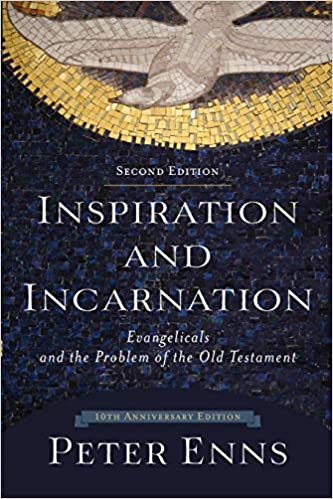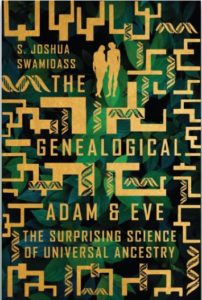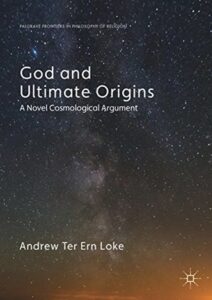Peter Enns’ “Inspiration and Incarnation: Evangelicals and The Problem Of The Old Testament” is a much needed book. I have noticed that a lot of people tend to think The Bible is in error simply because they have faulty expectations of how, to use Enns’ words “The Bible should behave”. Fundamentalists and Evangelicals, both trained theologians and people in the laity, have formulated theories of inspiration (i.e the process of how we got this thing called The Bible) from the top down rather than from the bottom up. I agree with Peter Enns’ statement in the book – not to speak of my favorite Old Testament scholar Michael Heiser who has said the same thing – that we need to form a theory of inspiration from the bottom up rather than the top down. What we mean by this is that we need to study the biblical text and form our theory of inspiration (and by extension, inerrancy) based on what we find in the text. We shouldn’t formulate a theory of inspiration and then go to the text with an expectation of what it should say. If we do that, we’re bound to disturbed with what we find. “A God inspired text would NEVER tell the story this way”, “A God inspired text would conform to true science”, “A God inspired text would never employ common Ancient Near Eastern symbols, idioms, and motifs. It’s supposed to be unique!”
I’ve been preaching this message for a while. I am a biblical inerrantist. The Bible is inerrant in all that it intends to affirm. Its inerrant in all that it intends to teach. Or to put it another way; everything God wants us to believe is true. This implies of course that there are some things The Bible doesn’t intend to teach. For example, the obviously false “dome cosmology” that you find scattered all over the pages of The Bible and in Ancient Near Eastern texts is not something The Bible intends to teach. That we think with our hearts is not what God intends to teach. More commonly recognized; the words of Job’s so-called “comforters”, the lies of Satan, Caiaphas’ accusation that Jesus committed blasphemy, et. al. are not what The Bible intends to teach. Not everything The Bible contains is what it intends to teach.
A lot of Christians (and former Christians) get disturbed with the fact that, for example, Genesis 1 shares so much in common with ANE creation myths. Christians and apostates who apostatized on account of some of the “problems” Enns wrestles with in the book comes from a subconsious view that The Bible dropped out of Heaven. Often we give lip service to denying a dictation theory of inspiration, but in practice, we deny it. The Bible is a “Divine -Human book”.
The Premise Of The Book
Peter Enns’ approach to inspiration is to adopt what he calls an “Incarnational Model”. Just as Jesus is 100% God and 100% human, The Bible is also fully divine and fully human. God breathed the content, but He did so through the pens of human beings. And just as Jesus showed signs of humanity (e.g getting hungry, tired, wanting alone time), The Bible also shows signs of humanity (using common motifs, languages, idioms, symbols common to The Ancient Near East).Enns does not believe that The Bible is a purely human work. It comes from God. Neither does Enns believe The Holy Spirit used the biblical writers like speech-to-text software or that the books of the canon fall out of heaven. It is a divine-human book just as Jesus Christ is a divine-human person.
The three issues dealt with in the book are as follows
“1: The Old Testament and other literature from the ancient world: Why does the Bible in places look a lot like the literature of Israel’s ancient neighbors? Is the Old Testament really that unique? Does it not just reflect the ancient world in which it was produced? If the Bible is the word of God, why does it fit so nicely in the ancient world?
2:Theological diversity in the Old Testament: Why do different parts of the Old Testament say different things about the same thing? It really seems as if there are contradictions, or at least large differences of opinion, in the Old Testament.
3: The way in which the New Testament authors handle the Old Testament: Why do the New Testament authors handle the Old Testament in such odd ways? It looks like they just take the Old Testament passages out of context. Each of these three points has its own chapter in this book. To those perhaps more familiar with biblical studies, the importance of these three issues will be immediately recognizable.“1
There’s a lot of good content in all 3 portions of this book. I really did not anticipate that I would agree with Peter Enns as much as I do in this book. That isn’t to say that there weren’t times where I stopped reading and critiqued Enns in Soliloquy fashion as I usually do when I disagree with an author, but 95% of the time I think he’s on point. I would definitely recommend this book.
An Overview Of The Book’s Content
He then mentions some specific examples of diversity. The first is Proverbs, which sometimes tells us apparently contradictory things: answer a fool according to his folly, and don’t answer him according to his folly. The book doesn’t claim to be a set of rules to be memorized that anyone can be applied regardless of their circumstances. Rather, what we learn is that sometimes we need to do X, and at other times we need to do Y. Enns says, “it takes wisdom to know how this Proverb applies to this situation, which means an intimate knowledge of the circumstances.” Sometimes being rich is a good things, sometimes it’s a bad thing. Sometimes you need to answer a fool so that he doesn’t think his nonsense is irrefutable, but at other times, arguing with a fool will tempt you to stoop down to his level. This is just how Wisdom literature works. It is a feature of the very genre itself. As I have told others, the book of Proverbs is more a book of guidelines for wise living than a book of commands. Moreover, they’re not promises or guaruntees (Do X and Y will result without fail), rather, they are generally true rules of thumb. “Train up a child in a way he should go, and when he is old, he will not depart from it” is generally true. However, sometimes you can pour your heart and soul into raising your kids, but they throw off what you teach them and become a blot on society. Life is complex, and the proverbs are thus true generally rather than true absolutely (i.e in all times and places regardless of any nuancing factors).
After this, Enns talks about the book of Ecclesiastes, and says that in Ecclesiastes there, what we have is a more severe tension. Proverbs suggests that “If you do all these things, life will go well for you”; but Ecclesiastes points out that sometimes wise living doesn’t always payoff, and ultimately doesn’t since death awaits us all anyway (76-77). Here Ennskind of sounds like he’s talking about more than just diversity of perspective or some other kind of difference. He seems to subtly hint that this IS a contradiction. Enns says that we should not try to “iron out” the differences. What is one to take away from that? That Proverbs and Ecclesiastes contradict? The way I have always handled this difference is to say that as wealth is sometimes a blessing, sometimes a snare, so wisdom sometimes helps and sometimes it doesn’t.
Chapter 4 deals with the NT authors’ use of the Old Testament. Here he lists several examples of NT writers using OT texts (to either prove Jesus is the messiah or other reasons) in a way that would violate the method we know of as The Grammatical-Historical Method. He tries to justify The New Testament authors by basically saying that everyone else in the second temple period handled the Old Testament scriptures like that, so it would be arrogant to judge them by our modern standards of hermenuetics rather than theirs.
Enns summarizes his conclusions about the NT use of the OT:
1. The New Testament authors were not engaging the Old Testament in an effort to remain consistent with the original context and intention of the Old Testament author.
2. They were indeed commenting on what the text meant.
3. The hermeneutical attitude they embodied should be embraced and followed in the church today.
To put it succinctly, the New Testament authors were explaining what the Old Testament means in light of Christ’s coming. (115-16)
This last portion of the book left me unimpressed and unpersuaded. My position has been that for some text, the authors were indeed adding meaning to texts that original author and audience wouldn’t have understood, but that this was ok because the New Testament writers were inspired by The Holy Spirit to do so. The Holy Spirit was behind the inspiration of both The Old Testament and The New Testament. As Michael Heiser has said, “The New Testament is an inspired commentary of The Old Testament”. Yes, other second temple writers may have done the same thing, but they didn’t carry the authority of The Holy Spirit. At other times, like with Matthew citing Hosea 11:1, I see this as Matthew using the text typologically. Imagine a scenario in which Matthew cited Genesis 22 as proof that Jesus’ death fulfilled prophesy. “And so God sacrificed His Son Jesus on the cross. This was written to fulfill the scripture that says ‘God will provide the sacrifice’ and ‘You have not withheld from me your son. Your only son.” Many preachers and theologians see Abraham’s sacrifice of Isaac mentioned in Genesis 22 as a typology of God sacrificing Jesus. Just as Abraham was willing to sacrifice his son Isaac, so God was willing to sacrifice His Son Jesus. Just as Abraham, in a sense, received Isaac back from death (Hebrews 11:19), so God received His Son back from death. If I wrote a gospel and used those sentences from Genesis 22 in that way, I would not appealing to verbal-predictive prophesy, but typological prophesy. Typology is when one biblical event is similar and thus, foreshadows some future biblical event.
It has been said by theologians that just as Paul saw Jesus as the New Adam, the gospel authors saw Jesus as The New Israel. And thus, some of what the OT says about Israel can be seen as typologically predicting Jesus’ circumstances (e.g 40 years in the desert in Numbers – 40 days in the desert in Matthew 4). Of course, there are SOME prophesies about Jesus in The Old Testament that were verbal-predictive prophesies and which the grammatical-historical approach isn’t violated. Micah 5:2 says that a ruler would come forth from Bethlehem, and Zechariah 9:9 said Israel’s messiah would come to them riding on a donkey, for examples. But the ones that aren’t “Messiah will come and do X” type of prophesies, can be seen to be prophetic of Messiah according to other interpretive methods that aren’t uncommon even today (typology is not a foreign or controversial concept in any church that I am aware of). At least to some extent. I am no expert on messianic prophesy, and my knowledge of messianic prophesy probably doesn’t go beyond what the average pew sitter knows. This is an area to which I hope to one day devote more study. But with regards the messianic examples he pointed out, I never really saw to be an issue.
As for non-messianic prophesies (Hebrews 1 making use of multiple Psalms and making it a conversation between two persons of The Trinity), I would file this under The New Testament being an inspired commentary on the old, with the Spirit of God saying “These passages had more meaning than you previously thought”.
I will read this book again at some point. I’ve read the whole book with an open mind with a spirit of charity, and in a second reading, I will do just that again. However, in Enns’ suggestion that we should follow suit in doing what second temple and the New Testament writers did in handling the Old Testament, I just don’t see how this doesn’t collapse into hermeneutical relativism, with people being imaginative and inventive in all kinds of ways with the biblical text, with there being no method of determining the validity of one reading over another.
I am in agreement with Old Testament scholar John Walton that “The text cannot mean what it never meant.” UNLESS a later inspired voice comes along and reveals additional layers of meaning. Were the writer of Hebrews not given the stamp of approval by The Holy Spirit, I would indeed chastise him for improper hermenuetical method. “Stop butchering these Psalms! A Trinitarian conversation is not what that’s about!” But if God says that’s what it’s about, who am I to argue with Him?
Conclusion
Like I said, to my surprise, I found more to agree with in Enns’ book than to disagree with. I would definitely recommend it. The final section is extremely lack luster, and thus my rating is not as high as it would have been. I was excited about that part of the book, but it failed to deliver the goods in my opinion. Half a star is also knocked off by essentially denying The Deuteronomy 32 worldview in the portion about theological diversity. But all and all this is a solid work on the doctrine of revelation, and I’m glad that I took the time to read it.
————————————–
1: Peter Enns. Inspiration and Incarnation: Evangelicals and the Problem of the Old Testament (Kindle Locations 226-231). Baker Publishing Group. Kindle Edition
Share this:
- Share on Facebook (Opens in new window) Facebook
- Share on X (Opens in new window) X
- Print (Opens in new window) Print
- Email a link to a friend (Opens in new window) Email
- Share on Pinterest (Opens in new window) Pinterest
- Share on Reddit (Opens in new window) Reddit
- Share on LinkedIn (Opens in new window) LinkedIn
- Share on Tumblr (Opens in new window) Tumblr
Discover more from Cerebral Faith
Subscribe to get the latest posts sent to your email.




